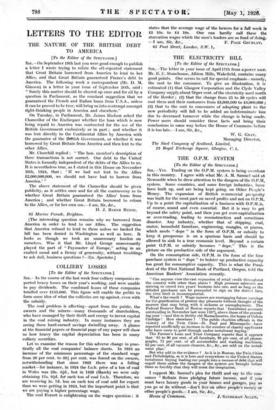COLLIERY LOSSES [To the Editor of the SPECTATOR.] SIR,—In the
course of the last week four colliery companies re- ported heavy losses on their year's working, and were unable to pay dividends. The combined losses of these companies totalled over £155,000. This figure will enable the public to form some idea of what the collieries are up against, even with the subsidy.
The coal problem is affecting—apart from the public, the owners and the miners—many thousands of shareholders, who have managed by their thrift and energy to invest capital in the coal mining industry. In many instances they are seeing these hard-earned savings dwindling away. A glance at the financial papers or financial page of any paper will show us how heavy the capital depreciation has been in many colliery securities.
Let us examine the reason for this adverse change in prac- tically all the coal companies' balance sheets. In 1924 an increase of the minimum percentage of the standard- wage from 20 per cent. to 33/ per cent. was forced on the owners, notwithstanding that since 1923 there was a falling market--Lfor instance, in 1924 the f.o.b. price of a ton of coal in Wales was 23s.- 4/d., but in 1926 (March) we were only obtaining 17s. 9/d. for each • ton of coal f.o.b. Therefore, we are receiving 5s. 7d. leis on each ton of coal sold for export than we were getting in 1924, but the important point is that we are paying a higher percentage wage.
The coal Report is enlightening on the wages question : it
states that the average wage orthe hewers for a full week its £3 10s. .to £4 10s. One can hardly call these the starvation wages which the men's leaders are so fond.of doing.
—I • am, Sir, l&c., F. PAGE GOLELAY. . 62 Pont Street,- London, S.W.1.














































 Previous page
Previous page